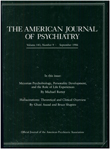Neuroendocrine and personality variables in dysthymic disorder
Abstract
In an attempt to characterize a subgroup of depressed patients diagnosed as having dysthymic disorder, the authors gave them two commonly used biological tests for depression and several personality inventories and compared the results with those from age- and sex- matched normal control subjects. There were no significant differences between the 11 early-onset dysthymic disorder patients and the 11 controls on the dexamethasone suppression test or the thyrotropin- releasing hormone test. The personality questionnaires, however, showed that the dysthymic disorder patients were significantly more neurotic, extrapunitive, and intrapunitive and had significantly lower self- esteem than the control subjects.
Access content
To read the fulltext, please use one of the options below to sign in or purchase access.- Personal login
- Institutional Login
- Sign in via OpenAthens
- Register for access
-
Please login/register if you wish to pair your device and check access availability.
Not a subscriber?
PsychiatryOnline subscription options offer access to the DSM-5 library, books, journals, CME, and patient resources. This all-in-one virtual library provides psychiatrists and mental health professionals with key resources for diagnosis, treatment, research, and professional development.
Need more help? PsychiatryOnline Customer Service may be reached by emailing [email protected] or by calling 800-368-5777 (in the U.S.) or 703-907-7322 (outside the U.S.).



